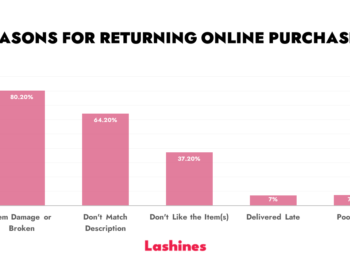Have you ever felt overwhelmed while sifting through countless suppliers on Alibaba? Worried about costs ballooning, but equally concerned about quality? You’re not alone.
Private labeling eyelash extensions from China might be the game-changer you’ve been looking for. Not only can it offer significant cost benefits, but with the right supplier, quality isn’t compromised.
Ready to dive in? Let’s untangle the web of Alibaba and expose the real cost savings of private labeling from China.

What’s the Real Savings Behind Eyelash Extension Private Labeling from China?
Ever scrolled through a beauty forum and seen a post about a brand’s new eyelash line, only to discover it’s from a well-known supplier in China? Or, have you wondered how startups can launch with competitive prices while maintaining product quality?
Private labeling from China has emerged as an effective strategy to achieve cost benefits without compromising on product quality. It’s the answer to how many brands have managed to offer premium products without the hefty price tag.
Intrigued? Let’s delve deeper into the world of eyelash extension private labeling and its real cost benefits.
Why is China the Hub for Eyelash Extension Private Labeling?
China has long been a manufacturing powerhouse. But why has it become the preferred destination for eyelash extension private labeling?
- Economies of Scale: Large factories in China produce in bulk, translating to lower costs per unit. This means brands can achieve significant cost savings when ordering in large quantities.
- Raw Material Accessibility: China is a major producer of raw materials, like PBT fibers, used in eyelash extensions. Local sourcing results in cheaper and quicker production.
- Skilled Labor Force: The country has a rich pool of skilled artisans specializing in eyelash production. This specialized labor force ensures high-quality products.
But, Is Cheaper Always Better?
An age-old debate. When it comes to private labeling, however, cheaper doesn’t necessarily mean a dip in quality.
- Quality Control: Many Chinese suppliers follow rigorous quality control processes, ensuring products meet international standards. Ask for certifications like ISO9001 to verify.
- Customization: Suppliers offer customization options, allowing brands to tweak designs, materials, and packaging. This flexibility ensures brands get products aligned with their vision.
- Direct Communication: Directly communicating with suppliers means faster problem resolution and a clearer understanding of product specifications.
How Do the Savings Translate to Brands and Ultimately, Consumers?
With private labeling, brands cut out middlemen, reducing markups. Savings achieved during production can be used to:
- Offer Competitive Prices: By saving on production, brands can set competitive retail prices, enticing consumers.
- Reinvest in Business: Whether it’s marketing, R&D, or expanding product lines, brands can reinvest their savings to grow.
- Enhance Packaging and Branding: Quality packaging can make products stand out. Brands can utilize savings to invest in premium packaging, further enhancing product appeal.
Is Navigating the World of Private Labeling Complex?
Admittedly, diving into private labeling can be daunting. There’s a plethora of suppliers, each promising the moon. Research, due diligence, and understanding specific business needs can, however, simplify the process.
- Start with Samples: Before bulk ordering, always ask for samples. It’s a small investment that can prevent bigger losses.
- Communicate Clearly: Ensure suppliers understand your requirements to avoid any future discrepancies.
- Consider the Full Costs: While the product might be cheaper, consider other costs like shipping, customs duties, and potential returns.
What About Shipping and Logistics?
Navigating international logistics can be daunting. How does China fare here?
- Integrated Logistics: Many suppliers offer end-to-end logistics solutions, simplifying the shipping process.
- Wide Range of Shipping Options: From expedited to economy, businesses can choose based on their budget and urgency.
- Transparency: Real-time tracking and clear communication ensure businesses are always in the loop.
Lost in Alibaba’s Maze? How Can You Spot Genuine Eyelash Extension Private Label Suppliers?
Ever spent hours scrolling Alibaba, only to be left feeling more confused than when you started? Been bombarded with endless supplier options, each claiming to be the “best” in the industry? How do you filter the genuine from the gimmicks?
The key to navigating Alibaba’s vast marketplace lies in knowing what to look for and asking the right questions. By understanding the markers of quality and being meticulous in your vetting process, you can confidently select a reliable eyelash extension private label supplier.
Eager to uncover the secret? Journey with us as we unlock the strategies to find top-notch suppliers amidst Alibaba’s bustling bazaar.
Why is Alibaba So Overwhelming for New Buyers?
With thousands of listings and myriad suppliers vying for attention, it’s easy to feel lost in Alibaba. But what makes this platform so bewildering?
- Volume: Alibaba hosts thousands of suppliers, with each category brimming with choices. Filtering genuine suppliers becomes a Herculean task.
- Similar Listings: Many suppliers offer similar products, leading to an overlap in listings. This redundancy can cause confusion for new buyers.
How Can You Identify Genuine Eyelash Extension Suppliers?
Spotting genuine suppliers is an art. With the right techniques, you can ensure a smooth buying experience.
- Gold Supplier Badge: This badge indicates that the seller has been verified by Alibaba. It’s a good starting point but isn’t foolproof.
- Response Rate: A higher response rate often signals a supplier’s commitment to customer service. While not a sole indicator, it’s a good metric to consider.
- Transaction History: This gives an insight into a supplier’s track record. Consistent transactions often imply a stable business.
What Questions Should You Ask Potential Suppliers?
The first interaction with a potential supplier is crucial. Here’s what to ask:
- Samples Available?: Always start with a sample. It’s a tangible way to assess product quality.
- MOQs (Minimum Order Quantities)?: Understand their MOQs. This helps in gauging if they fit your business model.
- Lead Times?: How long do they take from order placement to delivery? This impacts your inventory planning.
- Certifications and Compliance?: Especially for beauty products, understanding compliance is crucial. Ask for relevant certifications.
- Customization Options?: For private labeling, customization is key. Gauge their flexibility in product and packaging customization.
- Previous Clients or References?: If they’ve served reputed clients, it’s a positive signal. Don’t shy away from asking for references.
Are Reviews and Feedback Reliable?
While reviews provide insights, they come with caveats.
- Check for Detailed Reviews: Generic reviews might not be very helpful. Look for reviews detailing specific experiences.
- Beware of Fake Reviews: Like any platform, Alibaba might have fake reviews. Cross-reference feedback across different listings.
- Feedback Score: A cumulative score based on various parameters. Higher scores usually indicate reliable suppliers.
How to Ensure Smooth Communication with Suppliers?
Effective communication is the bedrock of any business relationship.
- Be Clear and Concise: Outline your requirements clearly. Avoid jargon unless it’s industry-specific.
- Utilize Alibaba’s Inbuilt Chat: This tool records conversations, ensuring both parties can reference past discussions.
- Respect Time Zones: Remember, you might be dealing with suppliers in vastly different time zones. Schedule discussions accordingly.
Navigating Alibaba’s vast marketplace might seem daunting, but with the right strategies and a keen eye for detail, you can find quality eyelash extension private label suppliers. Equip yourself with knowledge, ask the right questions, and step confidently into the world of global sourcing. Happy hunting!
Feel Tiring with Alibaba? 9 Ways to Find Reliable Eyelash Extension Private Label Suppliers Besides Alibaba
The quest to find dependable suppliers for eyelash extension private label products can sometimes feel like navigating through a labyrinth. While Alibaba has established itself as a behemoth in the B2B sourcing space, it isn’t the only avenue. Let’s explore ten alternative methods to source reliable suppliers for your business.
1. Using Search Engines (e.g., Google):
- Description: Harnessing the power of search engines, with Google standing as the colossus, can provide you an entryway into a plethora of supplier resources. By merely typing in specific keywords, you can dive deep into an ocean of potential supplier websites, directories, and reviews.
- Advantages:
- Google, being the world’s largest search engine, ensures unparalleled reach and reliability.
- Immediate access to a vast, varied array of suppliers spanning all corners of the globe.
- Stay updated with real-time insights into businesses and ever-evolving industry trends.
- Utilize advanced search functions to tailor your findings based on exact requirements.
- Disadvantages:
- Given the magnitude of results, a discerning approach becomes crucial.
- Essential to undertake rigorous research on suppliers before any commitment as anyone can set up a website.
2. Industry Trade Shows
- Description: Trade shows act as powerful global platforms where businesses, both burgeoning and established, showcase their products and skills. These events attract a spectrum of industry professionals, from manufacturers to buyers, facilitating a rich exchange of ideas, trends, and business opportunities.
- Advantages:
- Direct interactions allow for immediate rapport-building, bridging cultural or business gaps.
- An unrivaled opportunity to assess product quality, innovation, and even the buzz surrounding a supplier.
- Engaging in dialogues can lead to insights on a supplier’s business ethos, reliability, and transparency.
- Provides a holistic experience of understanding industry trends, innovations, and the competitive landscape.
- Disadvantages:
- Attending global trade shows can be financially burdensome due to travel, accommodation, and associated expenses.
- Time-consuming, especially for businesses with limited resources or personnel.
- Despite the investment of resources, immediate collaborations or deals are not always guaranteed.
- The vast number of exhibitors might be overwhelming, making the vetting process challenging.
3. Social Media Networks:
- Description: In today’s interconnected world, social media platforms like LinkedIn, Instagram, Facebook, and Twitter have transformed into business hubs. These platforms are not just for socializing; they’ve evolved as potent tools where businesses build their brand, showcase their offerings, and engage with potential partners and customers.
- Advantages:
- Abundant visual content offers real-time glimpses into product aesthetics, innovations, and quality, often portraying a brand’s entire journey.
- Direct messaging features allow businesses to initiate spontaneous conversations, leading to quicker engagement and feedback loops.
- Active communities and hashtags can help identify trending suppliers and products in the eyelash extension private label domain.
- Features like reviews, comments, and shares provide an indirect measure of a supplier’s reputation and customer satisfaction.
- Some platforms, especially LinkedIn, provide insight into the supplier’s network, partnerships, and endorsements.
- Disadvantages:
- The vastness of social media requires keen eyes and discernment; it’s essential to verify the authenticity of suppliers to avoid potential scams.
- Passive scrolling and casual engagement might not lead to concrete leads or results, requiring a strategic approach to networking.
- Over-reliance on the aesthetic appeal from images might lead to overlooking other essential supplier metrics like reliability, communication, and ethical practices.
- Social media personas can sometimes be deceptive, necessitating deeper due diligence before business engagements.
4. Google Map or Local Business Directories:
- Description: In today’s digital landscape, local business directories and platforms like Google Maps are pivotal. For those seeking specialized products like “eyelash extension private label”, these platforms can be goldmines.
- Advantages:
- Localized Supplier Discovery: Google Maps and similar directories allow businesses to pinpoint suppliers in specific regions, catering to logistical preferences and known production hubs.
- Reputability Through Reviews: Businesses on platforms like Google Maps are often reviewed and rated, providing insights into their reliability and product quality.
- Endorsements: Directories sometimes collaborate with local commerce chambers, adding a layer of trust. Such affiliations can assure businesses of the legitimacy and reputation of a supplier.
- Effective Filtering: Modern directories provide filters, helping businesses quickly shortlist potential suppliers based on reviews, services, and other criteria.
Disadvantages:
- Outdated Listings: Some directories may have listings that are outdated or no longer operational, which can be misleading.
- Coverage Limitations: Not all emerging businesses or niche suppliers might be listed, limiting the available options.
- Review Bias: Reviews, while useful, can sometimes be skewed, making it imperative to cross-check with other sources.
5. Online Forums and Communities:
- Description: Digital hubs where experts and enthusiasts of the eyelash extension private label industry gather, share knowledge, and often, drop supplier recommendations.
- Advantages:
- Gain insights from industry peers and veterans who have been in the trenches.
- Opportunity to ask specific questions and receive recommendations based on actual experiences.
- Some forums host dedicated threads for supplier reviews, offering a curated list of trusted names.
- Active participation can lead to direct supplier referrals or partnerships.
- Disadvantages:
- With the vast amount of information, discerning and filtering become critical. Not all advice will be relevant.
- The possibility of encountering biased or promotional posts under the guise of genuine advice.
- Constant vigilance is required to sift through discussions and find valuable insights.
- Anonymity can lead to exaggerated or misleading claims; due diligence is paramount.
6. Online Webinars and Workshops:
Description: In our interconnected era, online webinars and workshops are evolving into indispensable platforms for knowledge exchange and networking.
Advantages:
- Remote Connectivity: Engage with suppliers, market experts, and peers without the need to travel. A cost-effective and efficient approach.
- Pulse on Market Dynamics: These events often discuss the latest trends, technologies, and emerging players, offering an updated snapshot of the market.
- Interactive Q&A Sessions: Directly ask questions or address concerns to experts, fostering a clearer understanding of potential collaborations.
Disadvantages:
- Active Participation Needed: Simply attending isn’t enough. One must be proactive to network, ask questions, and glean insights.
- Time Zone Differences: Global events may sometimes be scheduled in different time zones, posing challenges for real-time participation.
7. Global Sources:
Description: Global Sources stands as another veteran B2B platform, functioning as a nexus between businesses and a vast array of suppliers spanning various sectors.
Advantages:
- Rigorous Verification: The platform takes pride in its premium supplier listings, each of which undergoes a comprehensive verification process, lending an added layer of assurance.
- Trade Shows Galore: Global Sources further strengthens global trade ties by regularly organizing trade exhibitions, a hotspot for businesses eager to make meaningful connections.
Disadvantages:
- Overwhelming Choices: For those new to the B2B space, the extensive list of suppliers can seem overwhelming, necessitating a strategic approach.
- Screening Imperative: Despite the platform’s best efforts, businesses should still be vigilant and undertake their own meticulous supplier screening.
8. Niche B2B Platforms:
Description: Beyond generic trading platforms, there are specialized B2B platforms that cater specifically to the cosmetics and beauty industries. These curated spaces ensure a more precise fit for businesses diving deep into the realm of “eyelash extension private label.”
Advantages:
- Streamlined Search: Thanks to their industry-specific focus, the searches here are far more targeted, providing relevant results tailored for beauty enterprises.
- Credible Suppliers: Many of these niche platforms rigorously vet their suppliers, ensuring businesses connect with trustworthy partners.
Disadvantages:
- Limited Listings: Given their specialized nature, they might not have as expansive a listing as more general platforms.
- Subscription Costs: To access some top-tier features or suppliers, the platform might levy premium charges.
9. Referrals from Industry Contacts:
Description: Leveraging personal networks and industry relationships to get trusted supplier recommendations.
Advantages:
- Tried and Tested: Referrals often come from trusted contacts who have had prior engagements with the suppliers, reducing the risk of collaboration.
- Shortens the Search: Instead of scouring countless listings, a referral can immediately direct you to a reliable supplier, saving time and energy.
Disadvantages:
- Limited Scope: Depending on the size and diversity of your network, you may get limited options.
- Bias Possibilities: Some referrals may have biases based on personal relations, which can cloud objectivity.
In Conclusion, while Alibaba is a dominant player in the supplier sourcing arena, myriad avenues can lead you to the perfect eyelash extension private label supplier. If the search becomes daunting or you’re weary of continuously vetting, it might be time to have a conversation with Lashines. As a leading private label eyelash extension supplier, Lashines prides itself on exceptional quality, consistent reliability, and a deep understanding of market trends. Instead of sifting through countless options, turning to proven experts like Lashines could be the game-changer you’re seeking. Diversifying your sourcing strategies and prioritizing trusted partnerships will undoubtedly pave the way for successful collaborations. Happy sourcing!




